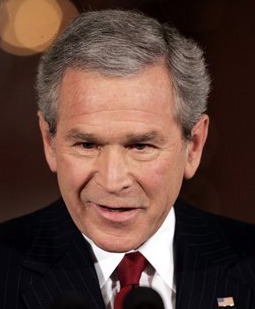Plato had his
cave. Apostle Paul had his glass, darkly. I had a motel in Elk Springs.
Elk Springs, Colorado, was nowhere in the summer of 1968, and it is nowhere now. All the
Google hits for motels, flowers and escort services have nothing to offer. The nearest jobs listed are in oil and gas exploration based in Vernal, Utah, which if it isn't Mormon country's first meth town, it will be.
In '68, I was riding from the Elk Springs Motel two hours each way to my shift on one of those rigs, reached over the kind of rough roads we're trying to keep out of the Arctic Wildlife Reserve. The facilities consisted of a five gallon grease bucket — the bottom cut out and toilet seat formed by bending the lip back with vice grips — over a hole hand-dug, out of sight from the drilling platform.
We did not receive home delivery of the
New York Times.
But I remember dragging in after dark one night, passing through the motel lobby, and seeing a broadcast from the Democratic National Convention in Chicago. A speaker was at the rostrum, and the snowy, backcountry reception made it look like confetti was swirling around him. Was it Humphrey? McCarthy?
Although I was a politically attuned college student in other months, I kept going. The image was too remote from my life at the moment. I was too cut off from context. I was tired.
Now here you are, peering at this post, and if you are like most blog readers, you have come from, or are heading to, more posts dissecting current events, obsessing over the latest nuance of the current non-development in the issue
du jour. You feel responsibly aware, acutely informed and possibly pissed. You have a sense of knowing.
Yet all of us — commenters and readers — are no closer to the real events than that temporary roughneck in Elk Springs. And we are so much closer than most Americans — the Howards, Frogs, Texes and Wades who crewed with me.
It is so easy to forget, until I have a conversation with someone intelligent, educated, responsible... and find their awareness of this blog world we're poking around in is even less than what I pulled from that snowy three seconds 37 years ago. These issues are too remote from their lives. They are too cut off from context. They are tired.
I'm writing this because I couldn't sleep, and because real life — the stuff close enough to raise up and bite you, as we used to say — is shaking its rattles. I'm thinking about ANWR and secret courts and eavesdropping and creationism and Iraq and corruption and family in trouble, and right now, it isn't even close what matters.
I want to be a good citizen 24/7, but what's going on out there in the world will go on whether or not I'm paying attention. What I think about everything is less important than what I do about something.




